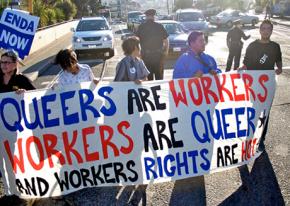Another step toward ENDA
Legislation that would outlaw discrimination against LGBT people passed the U.S. Senate--but it has a ways to go before it becomes law, as reports.
THE U.S. Senate passed the Employment Non-Discrimination Act (ENDA) in early November with a strong 64-32 margin in favor, but the legislation faces an uphill battle to pass the Republican-controlled House of Representatives.
ENDA would outlaw employers from discriminating on the basis of actual or perceived sexual orientation and gender identity. Some version of the legislation has been introduced in Congress almost every year since 1994, but the November 7 roll call was only the second time the Senate voted on ENDA, and the first time it passed. Significantly, the legislation today contains protections for transgender people that have been left out of previous versions.
As with the repeal of the Pentagon's anti-gay "don't ask, don't tell" policy, there are unwarranted exclusions in ENDA--the current bill includes an exemption to discriminate for religious organizations, the military and small businesses. According to the New York Times, "The exemption would extend beyond churches and other houses of worship to any religiously affiliated institution, like hospitals and universities, and would allow those institutions to discriminate against people in jobs with no religious function, like billing clerks, cafeteria workers and medical personnel."

Only 17 states and the District of Columbia currently provide LGBT-inclusive workplace protections.
The transgender protections in the current ENDA are especially important. While all workers face unemployment, job insecurity and declining wages, transgender people face these at two to four times the national average. A recent study by the Movement Enhancement Project titled "A Broken Bargain for Transgender Workers" reveals that unemployment rates for transgender people are twice the national average. More than 44 percent of transgender workers are underemployed and about 15 percent live in households that earn less than $10,000 per year.
The everyday stories of discrimination are even more staggering. A 2011 report by the National Gay and Lesbian Task Force and the National Center for Transgender Equality titled "An Injustice at Every Turn" revealed that "the combination of anti-transgender bias and persistent, structural racism was especially devastating." Ninety percent of those surveyed reported experiencing harassment, mistreatment or discrimination on the job, or took actions like hiding who they are to avoid it. Forty-seven percent said they had experienced an adverse job outcome, such as being fired, not hired or denied a promotion because of being transgender or gender non-conforming.
It's no wonder that business groups, including the U.S. Chamber of Commerce, the National Small Business Association, the Business Roundtable and the National Federation of Independent Business have taken a publicly "neutral" position on ENDA. They have conservative politicians like House Speaker John Boehner ready to oppose ENDA in the House. "The Speaker believes this legislation will increase frivolous litigation and cost American jobs, especially small business jobs," said Boehner spokesman Michael Steel.
HISTORICALLY, STEPS toward eliminating LGBT discrimination have always been tied to social struggles that challenge the structural nature of discrimination.
The modern movement for LGBT rights was launched with the Stonewall Riots in 1969, when young, multi-racial, gender non-conforming residents of New York City's Greenwich Village stood up to the recurring police raids at the Stonewall Inn, a well-known gay bar. The resulting movement saw itself connected to struggles for Black power, women's liberation and anti-imperialism.
This was context for the Equality Act of 1974--a sweeping proposal for a federal ban on discrimination against lesbians, gay men, unmarried persons and women in employment, housing and public accommodations. Throughout the rest of the 1970s, several versions of the same bill were proposed, but were never passed.
Legislation advancing LGBT rights didn't appear again in Washington until 1994, with the more narrowly defined forerunner of ENDA, which didn't include protections for transgender people.
Since the late '70s, most people in the U.S. have supported non-discrimination policies. Gallup polls in 1977 showed that 56 percent of the population supported equal job opportunities for LGBT people. By 2008, that percentage had increased to nearly 90 percent.
The social movements of the 1960s and '70s were on the retreat in the decades that followed, as Democratic Party politicians spoke to their demands on occasion, but failed to deliver.
Still, the sentiment for LGBT rights continued in the activism of ACT-UP and Queer Nation in the 1980s, with an urgency driven by the severity of the AIDS crisis. In 1982, the Newspaper Guild--now a part of the Communications Workers of America (CWA) union--won the first domestic partner benefits package in U.S. history. Since then, unions have fought for and won domestic partner benefits and anti-discrimination clauses in contract negotiations.
The movement took a new step forward with the mass mobilization against the anti-gay marriage Proposition 8 passed in California in 2008. Protests against the Prop 8 ban and for marriage equality spread across the country, culminating in the National Equality March that drew some 200,000 people to Washington in October 2009. Support for a trans-inclusive ENDA became a part of the struggle.
This upsurge in organizing is directly responsible for the Senate voting on an all-inclusive ENDA. Senate Minority Leader Mitch McConnell and Sen. Rand Paul tried to derail the legislation with an amendment to attach a national anti-union "right-to-work" for less provision to ENDA. The amendment went down to defeat.
The Republicans in the House don't want to see ENDA even come to a vote. It will be necessary to put pressure on Washington by raising our voices in support of LGBT equality--making the case again that workers' rights are LGBT rights.


